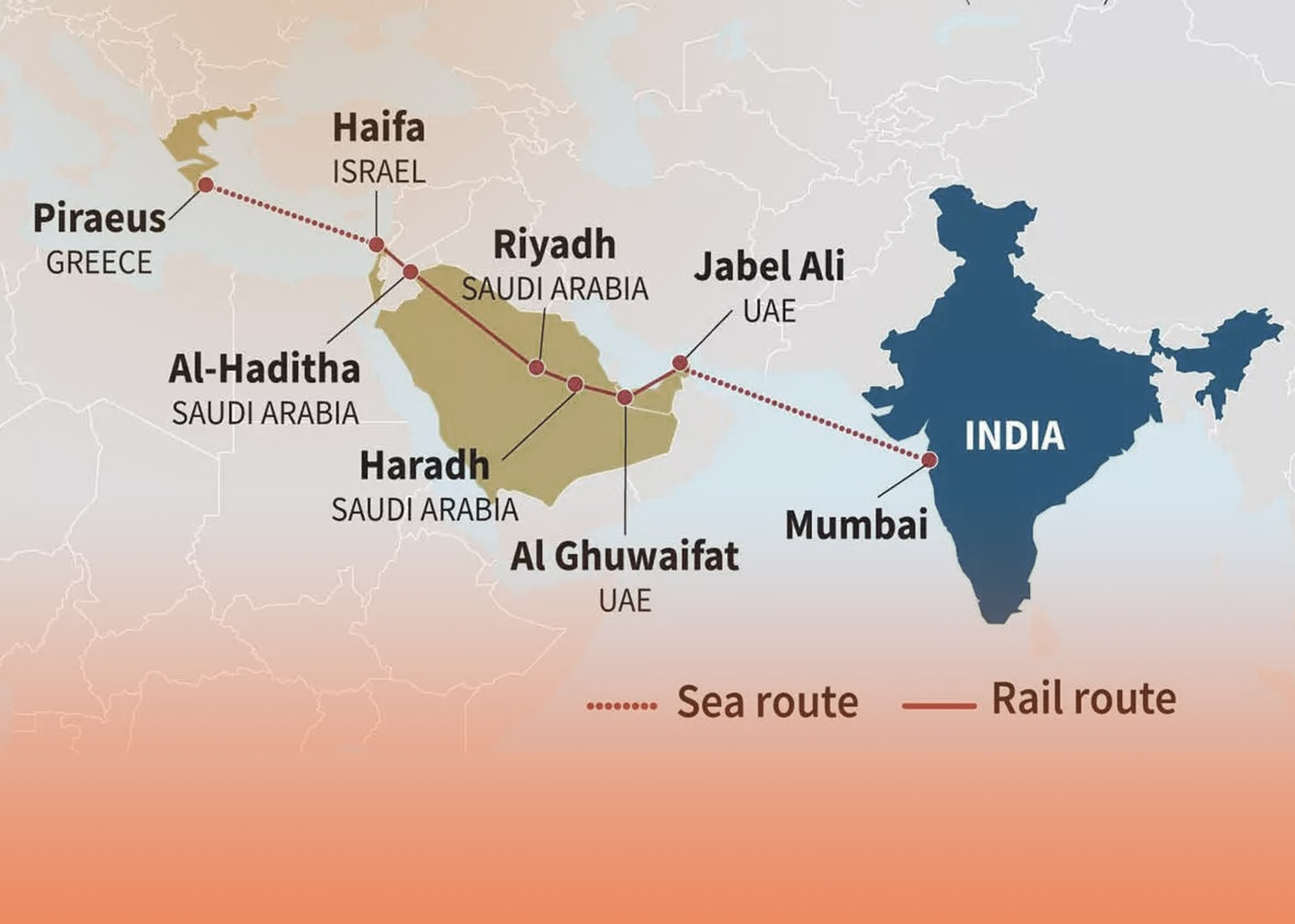The unveiling of the Spice Route potentially poses a significant setback to Sudani's ambitious vision of bridging Asia and Europe through a development road project. Indeed, global infrastructure endeavors carry both economic and political significance, and this could explain why Iraq finds itself excluded from the recent initiative aimed at linking Asia and Europe, as unveiled during the latest G20 meeting.
Spice Route
India, along with key partners including Saudi Arabia, the UAE, Jordan, Israel, Italy, and France, with the support of the United States, has committed to collaborate on the development of the two-phase Spice Route within an estimated two-month timeframe. This ambitious project, known as the India-Middle East-Europe Economic Corridor (IMEC), will initially establish a link between India and the Gulf countries in the eastern segment. Subsequently, in its second phase, the corridor will extend northward, traversing Saudi Arabia and Jordan, culminating at the port of Haifa in Israel, and then extending into Europe through maritime routes.
While the Spice Route boasts a smaller number of participating countries compared to China's expansive Belt and Road Initiative, it is characterized by robust economies and heightened security. The collective economic strength of the eight Spice Route nations, with the United States, exceeds $42 trillion, out of the global economy's $105 trillion. Furthermore, several of these nations are either NATO members or partners, enjoying the support of the United States as the world's preeminent superpower.
While Saudi Arabia, the UAE, and Italy maintain involvement in China's project, India's pivotal role in the rival Spice Project, alongside strong backing from the United States and the potential for Italy's withdrawal, has prompted some observers to view Spice Route as a credible alternative to China's Silk Route 2013. This perception gains further significance when considered in conjunction with the 2020 Abraham Agreement and the establishment of the I2U2 Group in 2021, fostering cooperation between India, the United States, the UAE, and Israel. In reality, given the interconnectedness of the global economy and China's substantial role within it, it remains challenging for this project to entirely exclude China from the world economy, at least for the foreseeable future. Nevertheless, it has the potential to exert a significant influence on the world's geopolitical equilibrium.
Iraq’s Vision and Route Development Ambition
Back in December 2015, Iraq joined the China Initiative, also known as the Belt and Road Initiative (BRI). During that period under the leadership of Mustafa Kazemi, there was a more prominent focus on the New Syria project. This initiative aimed at fostering greater integration between Iraq, Jordan, and Egypt, ultimately seeking access to European markets. However, due to internal instability, particularly tensions among Shiite factions and the prevalence of Shiite pan-Islamist ideologies over economic and political priorities, Mustafa Kazemi's vision for a New Syria project has gradually faded into the background or, at the very least, been sidelined.
Once he has officially started his term, Iraqi Prime Minister Mohammed Shia Sudani hosted a conference focused on the nation's development trajectory, welcoming representatives from several neighboring countries. While the prospect of anchoring a major infrastructure project connecting the East and West could have constituted a significant economic and political triumph for Iraq, the announcement of the Spice Route appears to have cast doubt on the realization of this dream. Prior to the unveiling of the Spice Corridor( India-Middle East-Europe corridor), in 2021, the United States, India, Israel, and the UAE came together to establish the I2U2 Group, aimed at fostering cooperation across various domains. Building on this, the Abraham Agreement, initiated in 2020, has been actively working towards the normalization of relations between Arab and Israeli entities.
Meanwhile, France and the United States have bolstered their military presence in the Gulf region. However, Iraq has encountered significant challenges along its development path, grappling with numerous armed groups scattered along the route, and has yet to actualize the Sinjar agreement. Furthermore, there have been endeavors to exclude the Kurdistan Region from the project on technical grounds, fueling concerns that Iraq might exploit this initiative to weaken the Kurdistan Region, thereby perpetuating long-term instability.
In a broader context, the precarious nature of Iraq's political system, oscillating between federalism and centralization, poses a substantial threat to a project of this magnitude. Additionally, the potential for regional conflicts among neighboring countries could further impact the viability of this ambitious Iraqi endeavor.
Certainly, the presence of transportation infrastructure is just one piece of the puzzle when it comes to a country's involvement in an international corridor. Equally crucial is the capacity to ensure security and stability. Iraq, despite its potential, finds itself facing significant challenges that may have caused it to slip off the radar of many stakeholders in the Spice Corridor initiative. These challenges include sporadic missile incidents involving armed groups, internal Shiite tensions, ongoing disputes with the Kurdistan Region, uncertain future relations with the United States, and unresolved issues within the Sunni community. As such, Iraq's ability to participate meaningfully in this endeavor appears to be hindered by these multifaceted concerns.



